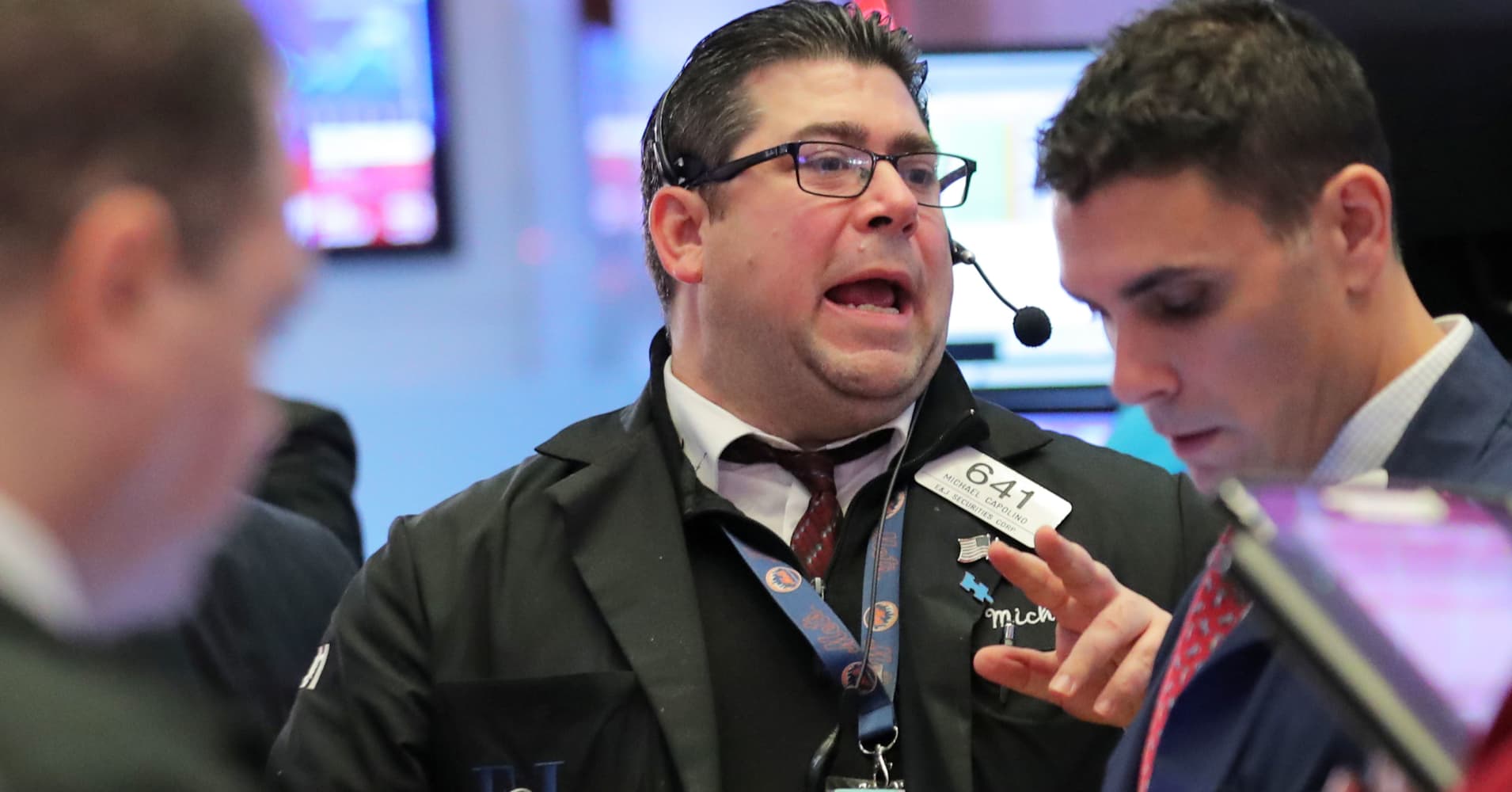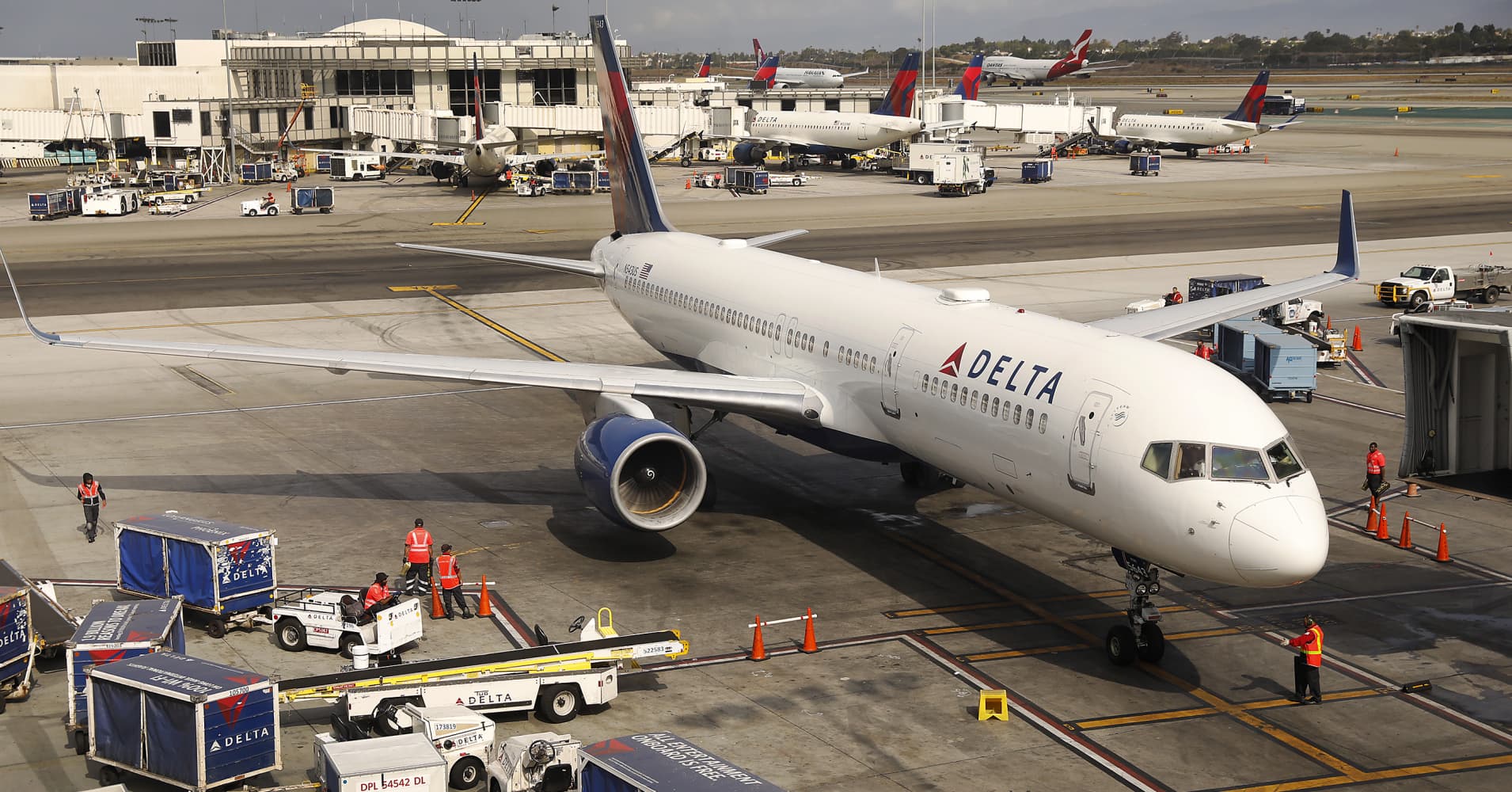
After January’s strong jobs report calmed some recession fears, investors will be picking through the next wave of earnings reports and economic data for clues on just how much the U.S. economy could be slowing.
Dozens of earnings, from companies like Alphabet, Disney and Eli Lily, report in the week ahead, and there are just a few economic reports like trade data and ISM services on Tuesday. Investors will also be watching the outcome of Treasury auctions for $84 billion in Treasury notes and bonds Tuesday through Thursday, after the Fed’s dovish tone helped put a lid on interest rates in the past week.
Nearly half the S&P 500 companies had reported for the fourth quarter by Friday morning, and 71 percent beat earnings estimates, while 62 percent have beaten revenue estimates. But earnings growth forecasts for the first quarter continue to decline as more companies report, and they are currently barely breaking even at under 1 percent growth, versus the 15 percent growth in the fourth quarter, according to Refinitiv.
“Granted the more we hear from companies, and particularly in terms of their guidance and projections on revenues, things can slowly change. The first thing companies do is they stop spending money. Cap spending slows down, and if revenue growth does not pick up, they let people go. This is still wait and see,” said Quincy Krosby, chief market strategist at Prudential Financial.
Krosby said the 304,000 jobs added in January did ease some concerns about a slowing economy, as did a stronger than expected ISM manufacturing report Friday. But the view of the first quarter is still unclear, as many economic reports were missed during the government shutdown. Economists expect growth in the first quarter of just above 2 percent, after growth of about 2.9 percent in the fourth quarter.
Stocks closed out January with a sharp gain on Thursday, and started February on Friday on a flattish note. The S&P 500 has rebounded about 15 percent from its Dec. 24 closing low. Last month’s 7.9 percent gain was the best performance for January in more than 30 years.
The old Wall Street adage says ‘so goes January, so goes the year.’ If that holds, stocks could finish 2019 higher. But February is another story, and on average, it is a flat month for the S&P 500.
“The tug of war that you saw in the market, that was going on in the last half of last year is playing out in the data. Some of the data is a bit lower, but some of the economic surprises are picking up to the upside rather than downside,” said Krosby.
Peter Boockvar, chief investment strategist at Bleakley Advisory Group, said the ISM may have improved but it reflected very low exports and flat backlogs, even though there was a snap back in new orders.
“I would fade the jobs report,” said Boockvar, noting the level of growth may have been inflated by government workers taking on part-time jobs during the government shutdown.
Boocvkar said the jobs report also looked strong on the surface, but he’s concerned the unemployment rate ticked up to 4 percent from 3.9 percent.
“The question of whether we go into a recession or not is how does the stock market affect confidence?” Boockvar said. Confidence readings in the past week were low, and consumer sentiment Friday was its lowest since before President Donald Trump took office.
Krosby said stocks could test recent lows or put in a higher low. If there’s a big selloff, “That would not necessarily mean it was a clue a recession is coming. It’s just a normal testing mechanism,” she said.
The Fed removed a big concern from the markets in the past week, when its post-meeting statement and Fed Chairman Jerome Powell’s briefing tilted dovish, assuring markets the Fed would pause in its interest rate hiking. Investors had feared the Fed would hurt the softening economy with its rate hikes. Now, the biggest fears are about the trade war between the U.S. and China and slowing Chinese growth.
The jobs report, and the ISM manufacturing data were also important because the lack of data during the government’s 35 day shutdown has left gaps in the economic picture.
“This is really a sign the Fed stole the thunder from the economic data. By saying they’re patient plasters over any kind of economic data in the near term, and I suspect the near term lasts through the first quarter because of the government shutdown, the weather, weak GDP,” said Marc Chandler, chief market strategist at Bannockburn Global Forex.
Chandler said the markets will be hanging on any news on the trade talks with China. “Even if it’s not the all encompassing trade deal we were promised, it’s a return to where we were before with China promising to buy energy and farm products. We’ll continue to have some kind of talks with the China, like we had under Obama and Bush,” said Chandler.
Monday
Earnings: Alphabet, Clorox, Gilead Sciences, Ryanair, Sysco, Legg Mason, Leggett and Platt, Seagate Technology, Beazer Homes, Hartford Financial, ON Semiconductor
10:00 a.m. Factory orders
2:00 p.m. Senior loan officer survey 7:30 p.m. Cleveland Fed President Loretta Mester
Tuesday
Earnings: BP, Disney, Archer Daniels Midland, Viacom, Becton Dickenson, Genworth Financial, Owens-Illinois, Vertex, Plains All American, Skyworks Solutions, Chubb, Suncor, Unum, Oaktree Capital, Pitney Bowes, Tableau Software, Torchmark, Snap, Allstate, The Container Store, Estee Lauder, Ralph Lauren
8:30 a.m. International trade
9:45 a.m. Services PMI 10:00 a.m. ISM nonmanufacturing
1:00 p.m. $38 billion 3-year note auction
Wednesday
Earnings: General Motors, Eli Lilly, Chipotle Mexican Grill, Fireeye, Zynga, Sonos, Valvoline, Humana, Cognizant Tech, Cummins, First Data, Regeneron, Spotify, Take Two Interactive, Carlyle Group, Netgear, Boston Scientific, BNP Paribas, GlaxoSmithkline, Daimler, Toyota, O’Reilly Automotive, Metlife, Snap
8:30 a.m. Productivity and costs
1:00 p.m. $27 billion 10-year note auction
7:00 p.m. Fed Chairman Jerome Powell at town hall with educators
Thursday
Earnings: Twitter, News Corp, Kellogg, Marathon, Expedia, Mohawk, Western Union, Intercontinental Exchange, Sanofi, Total, Yum Brands, Expedia, IAC/Interactive, Mattel, WR Grace, Dunkin Brands, Fiserv, Tapestry, Tyson Foods, Andeavor Logistics, Virtu Financial, Hain Celestial, Sealed Air, Triumph Group, Cardinal Health, S&P Global, Penske Auto Group, Sealed Air, Fiat Chrysler
8:30 a.m. Initial unemployment claims
1:00 p.m. $19 billion 30-year bond auction
3:00 p.m. Consumer credit
7:30 p.m. St. Louis Fed President James Bullard
Friday
Earnings: Arconic, Hasbro, Cleveland-Cliffs, Ventas, Philips 66, Buckeye Partners, Exelon
10:0 a.m. Wholesale trade







